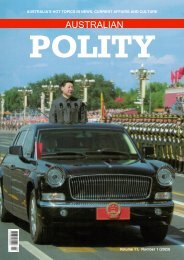Australian Polity, Volume 10 Number 1 & 2
March 2022 issue of Australian Polity
March 2022 issue of Australian Polity
- No tags were found...
Create successful ePaper yourself
Turn your PDF publications into a flip-book with our unique Google optimized e-Paper software.
“In every state, not wholly barbarous, a philosophy, good
or bad, there must be. However slightingly it may be the
fashion to talk of speculation and theory, as opposed
(sillily and nonsensically opposed) to practice, it would not
be difficult to prove, that such as is the existing spirit of
speculation, during any given period, such will be the spirit
and tone of the religion, legislation, and morals, nay, even
of the fine arts, the manners, and the fashions.”
- Coleridge, Essays on His Own Times.
As Coleridge observed, every age is the subject of a
prevailing philosophy. There are many elements to this
public culture: the content of everyday conversation,
the discourse of the daily media, the sermons from
pulpits and other places, the subject matter of political
debate, and the lessons of teachers and scholars, to
name just a few.
The prevailing philosophy is not static. Like a stream,
it flows in a series of eddies, washing this way and
that. It runs up against objects that can divert it in
differing directions. It can be shaped, over time, in one
direction or another. And it is subject to competing
claims and interpretations.
At its heart is the wellbeing of society. It defines how we
live together: What is permitted and what is forbidden;
what is right and what is wrong; what is lawful and what
is unlawful; what is supported and what is rejected.
Ideas are important. They shape the public culture.
They inform political discussions. They shape the role
of government. They define the relationships between
individuals, families, and the institutions of civil society.
They underpin policies and programs. In short, they
inform us about how we should live together.
There are certain ideas that we believe are important:
• That the dignity of the individual is the foundation
of all other relationships;
• That the political and economic freedom of the
individual is central to societal wellbeing, and that
personal responsibility underpins such freedom;
• That the convental relationships of love, loyalty,
friendship and trust exist outside the political
sphere but are essential to the health of society;
• That social order and shared values underpin a
healthy society;
• That government should be limited, without
forgetting that the protection of the poor and
the weak are pivotal political challenges;
• That functional families are crucial for the raising
of children and the stability of society;
• That society is a partnership across generations;
• That we belong to a nation, not a series of
segregated groups; and
• That our western, liberal democracy best enhances
individual freedom and human dignity and is worth
defending.
Our purpose therefore is to examine the principles
that underpin policy and to discuss proposals and
programme directions.
2 Australian Polity





